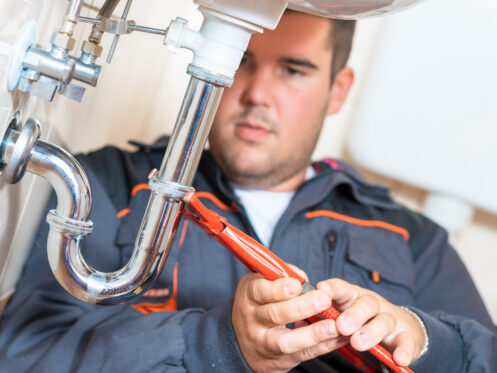It’s easy to remember what happens to the leftover oil and grease in the rush of everyday cooking. Cooking oil should not be disposed of improperly, as this damages the environment and increases the risk of expensive plumbing repairs. Everyone who cares about the environment and cooks at home needs to learn how to get rid of food grease safely. At Erica's Plumbing, Air Conditioning & Restoration in Boca Raton, FL, we want to help homeowners with their home appliances and help them protect their plumbing systems. Understanding how to properly and safely dispose of cooking grease protects your appliances and keeps your kitchen running smoothly. Read on to learn more about the best practices for responsibly handling and disposing of cooking grease.
Why Proper Grease Disposal Matters: Risks
There are several strong arguments in favor of proper grease disposal, the main one being a decrease in dangers that affect your house and the environment. Grease can harden within pipes over time if disposed of incorrectly, such as by pouring it down drains, resulting in obstructions that can back up and possibly overflow sewage. These blockages make it hard to do normal things, but they also need expensive fixes and are bad for your health because they are polluted.
Grease can also coat aquatic environments in natural water systems, lowering oxygen levels and disrupting food sources, which can endanger wildlife. Beyond the immediate aquatic life, the environmental impact affects downstream ecosystems and contributes to long-term pollution problems.
Grease improperly disposed of puts pressure on wastewater treatment facilities, raising operating expenses and sometimes resulting in fines for violating local ordinances. These facilities are necessary to ensure that water discharged back into natural rivers satisfies quality standards and to maintain public health standards.
Using absorbents, recycling, and cooling grease in containers are some of the appropriate grease disposal techniques that not only protect your home’s plumbing but also support cleaner rivers and sustainable living methods. It’s a minor adjustment that, when taken as a whole, has a big impact on protecting the environment and public health.
Cooling and Storing Grease: Initial Steps for Safe Handling
Properly cooling and keeping grease are important parts of running a safe kitchen. After cooking, put the grease in a heat-resistant jar and let it cool all the way down. As soon as it has cooled and hardened, tightly close the container to keep it from spilling or leaking. This not only ensures it’s safe to handle but also makes it easier to get rid of, like by reusing or throwing it away.
Using Absorbents: How to Solidify and Dispose of Liquid Grease
When dealing with wet grease in the kitchen, using absorbents is a good idea. Once the food is done cooking, add things that can soak up the oil, like coffee grounds, kitty litter, or paper towels. These things soak up the grease and make it solid, which makes getting rid of it easier and safer. Once the mixture has hardened, carefully pour it into a container that can be sealed and thrown away. Do not flush absorbents down the drain because they may still have grease on them that can cause clogs. This method not only keeps cooking surfaces cleaner but also makes sure that trash is thrown away in a responsible way.
Recycling Options: Turning Used Grease into Useful Products
Instead of throwing away used grease, it can be recycled, which is better for the earth. Biodiesel is a green fuel source that can be made from used cooking oil. This makes us less reliant on fossil fuels. Some recycling sites also turn grease into things like soap, cosmetics, and additives for animal feed. People can help make practices more sustainable and reduce the damage that grease removal does to the environment by taking part in these recycling programs.
Disposal Regulations: Local Guidelines You Should Know
For proper grease management, it’s important to know the rules for getting rid of trash in your area. Many cities and towns don’t let people pour grease down drains because it hurts sewer systems and water treatment plants. Instead, they tell people to put grease in containers, let it cool, use absorbents to make it solid, and then throw it away in the trash. Fines or damage to the earth can happen if you don’t follow the rules. Knowing these rules and using the right way to get rid of things will not only keep you out of trouble with the law, but it will also help keep the community healthy and the world healthy.
Eco-Friendly Disposal Methods
Eco-friendly ways to get rid of grease focus on reducing the amount of damage to the earth. You can turn used cooking oil into biodiesel, use absorbents to make grease solid so it can be thrown away safely, or compost your food scraps when it makes sense to do so. This cuts down on trash that ends up in landfills, saves resources, and encourages environmentally friendly practices.
Tips for Maintaining a Grease-Free Kitchen
Grease-free kitchen maintenance is essential for the longevity and smooth functioning of your kitchen’s plumbing and appliances and being hygienic. Here are a few useful hints to help you create and maintain a grease-free kitchen.
To start, use splatter guards when cooking to stop fats and oils from dripping onto walls, countertops, and stovetops. You may drastically cut down on the quantity of grease that builds up in your kitchen by taking one easy step. Wipe down surfaces like stovetops, backsplashes, and countertops right away after cooking. By doing this, any leftover grease is eliminated before it has an opportunity to solidify and become harder to clean.
Keeping your range hood and its fans in good shape is important. These filters capture grease and smoke particles, keeping them from adhering to kitchen surfaces.
When getting rid of grease, you should always let it cool down and solidify in a jar first. Grease should not be poured down drains since it can congeal in the pipes and eventually cause obstructions. When cleaning dishes or wiping down surfaces that have come into contact with grease, use hot water and dish soap. Grease residue is more efficiently broken down and removed as a result.
The amount of fat produced while cooking can be greatly decreased by using culinary techniques like baking, grilling, or roasting rather than frying. Ovens, microwaves, and toaster ovens should all be cleaned regularly since food particles and grease can build up during use.
Finally, make sure your plumbing is maintained by hiring a professional plumber to perform cleanings and inspections. By being proactive, you may help avoid grease accumulation in pipes, which, over time, can cause expensive and inconvenient clogs.
Contact Us Today
Keep in mind that disposing of grease responsibly is about protecting the environment and your home’s health, not just about convenience. By using these secure disposal techniques and keeping up with local laws, you can avoid expensive plumbing problems and contribute to sustainability. Contact us today if you’ve had plumbing problems because of grease or if you want professional help on how to keep your kitchen grease-free. We also offer a wide range of services, from home restoration to air conditioning and drain and sewer services. Erica's Plumbing, Air Conditioning & Restoration in Boca Raton, FL, is here to help you with all of your home maintenance, installation, and repair needs.

